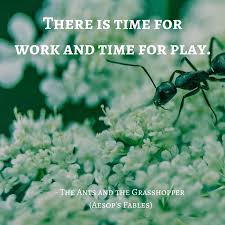
Maybe the Grasshopper Had it Right, Aesop Old Boy
(Read in less than :04)“Don’t neglect the future in times of plenty, for tomorrow you may need what you wasted today.”~Aesop
Most of us grew up on fables. The Fox and Grapes, The Crow and the Pitcher, and dozens more. I’ll give him this, Aesop was prolific, he wrote nearly 700 of these tales. He’s probably the most familiar of all fable tellers. I admit he knocked it out of the park on most of them. But in my opinion, he didn’t always bat .1000.
Let’s start with “The Ant and the Grasshopper.” I’m guessing most of you have some recollection of the movie Karate Kid from the ’80’s or the ’70’s TV series Kung Fu. The young protegee was often called “grasshopper”, code for clueless, but used with affection as the master taught him the ways of the wise.
The Cliff’s Notes if you missed it in English class
I’m sure anyone selling 401 Ks and Roth IRA really digs this tale of the industrious ant. The lazy good-for-nothing grasshopper spent his whole summer lolling around the sunflower field, singing and soaking up rays. Meanwhile, the clever little ant slaved away every day socking away provisions for the winter, refusing to stop and play. You know what happened next. The weather turned cold and the slacker grasshopper was up a creek without a paddle. He tried to mooch off his ant buddy who turned him away. Grasshopper dies, end of story.
What secret did the grasshopper know?
But wait. Isn’t there more to life than work work work? Maybe the grasshopper was far wiser than we think. Let’s look at the fable from another perspective. This story has been used to teach hard work and avoiding frivolous activity for centuries. In fact, the industrious life of ants is mentioned in the Old Testament book of Proverbs as a good example of wise thinking.
But today, we’re beginning to realize that it’s not enough to work hard and sacrifice for the hope of being rewarded “someday.” Hard work and “storing up of treasure” must be balanced with our enjoyment of today and living in the present moment. In fact, Jesus turned a lot of the Old Testament ideas upside down. For example when he taught “Do not store up treasures here on earth where moths and rust can destroy and where thieves break in and steal.” Matthew 6:19. Instead, he instructed his followers to “store up treasure in heaven and not worry about tomorrow.”

What this means to a bug’s life
Not worry about tomorrow? If you’re an ant, this would come as a crazy, radical idea. But here’s where it gets interesting. The typical life expectancy of an ant is about 45 -60 days. That means most ants do not live long enough to eat a single bite of the food they worked so hard to gather. If you’re a bee, the actuarial tables are just as grim. Bees literally work themselves to death in 4-6 weeks. Does that mean they’re altruistic or just hard-charging little creatures of habit?
On the other hand, grasshoppers live on average 60-90 days. Short, but longer than bees and possibly twice as long as ants. Along the way, they’ve had some fun, done some singing and dancing and basked in the sunshine. Lots less stress and pressure. Not a bad way to go. Maybe their longer life expectancy is due in part to a more easy-going view of how they spend their days.
What does it mean to us?
I struggle with this a lot. I’m a workaholic in recovery. We have to live in the world and work and have jobs. No question. We need to make a living so my point certainly isn’t to be a complete slacker. But I do encourage you to store up some treasure and find a little joy in each day. Make friends, sing a little, dance a bit and soak up the sunshine when you can. Patience, grasshopper. You will learn to find the balance.

Stick around because Thursday I’m going to talk about turtles. You know, as in the tortoise and the hare? That time Aesop hit a big one but I’m going to share how he could have knocked in some extra RBI’s! See you then!
Please subscribe! Just twice a week I’ll send you a sweet bit of thought to chew on, delivered right to your inbox.
“


